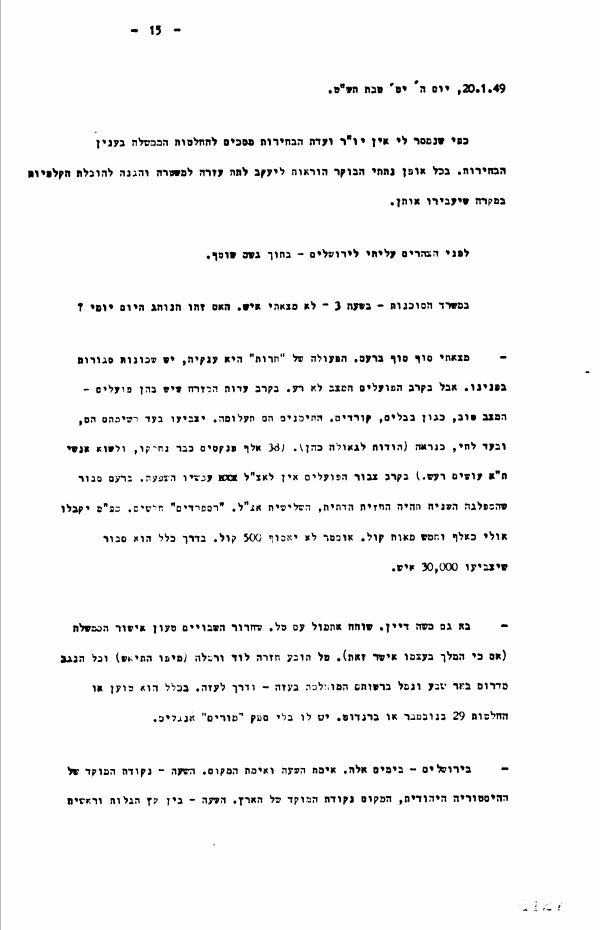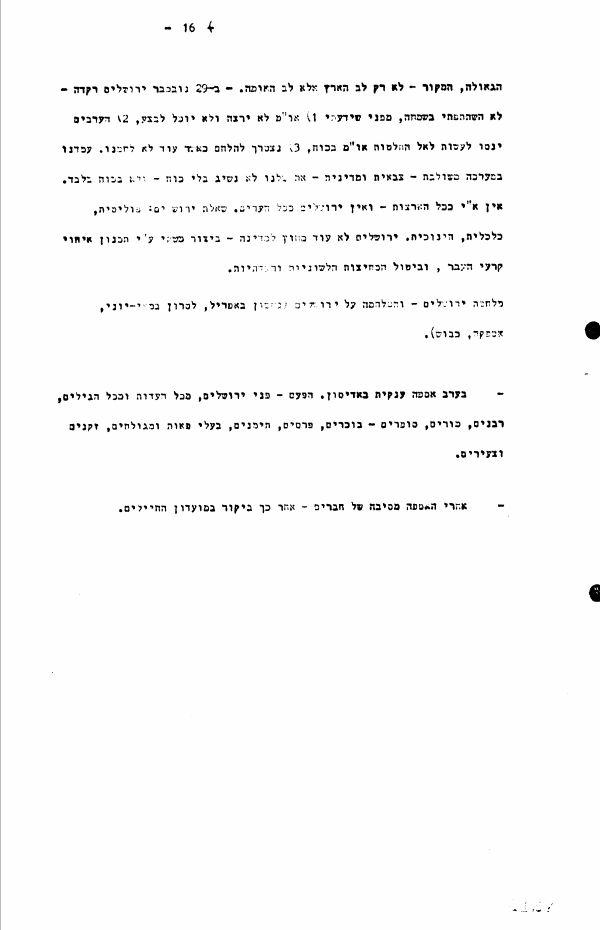Thursday, January 20, 1949
According to what I was told, the chairman of the election committee does not agree with the government decisions regarding the elections. In any event, this morning I instructed Ya'akov [Dori] to assist the police and provide protection for the transport of voting booths in the event that they're transferred [to a national center for counting].
Before noon I looked for Jerusalem - amidst torrential rain.
In the [Jewish] Agency office - at 3 p.m. - I found no one. Is this the daily practice?
- I finally found Baram. Herut's activity is extensive; some neighborhoods are closed to us. But among workers the situation is not bad. Among Mizrahi [Eastern] communities who have workers - the situation is good, for example Babylonians, Kurds. The Yemenites are a mystery. They'll vote for their own ticket, and for LEHI, apparently (thanks to Geula Cohen). (38,000 [ID] cards have already been distributed, and the Tel Aviv people are making a fuss over nothing.) Among the working public, ETZEL currently has no influence. Baram thinks that the second [largest] party will be the Religious Front, the third ETZEL. The Sephardim are weak. Mapam might receive about 1,500 votes. Auster won't draw 500 votes. Overall he thinks that 30,000 people will vote.
- Moshe Dayan also came. He spoke with Tall yesterday. The release of POWs requires government approval (although the king himself has approved it). Tall demands the return of Lod and Ramle (he's despaired of Jaffa) and the entire Negev south of Beersheva, and their absolute control of the port in Gaza - and the road to Gaza. In general he claimed: either the November 29 decisions or [the] Bernadotte [plan]. He undoubtedly has English "teachers."
- [Topics for a speech in Jerusalem:]
Jerusalem - these days - [embodies] the awe of the moment and the awe of the place. The moment - the focal point of Jewish history, the place - the focal point of the country; the moment - between the end of the galut [condition of exile, i.e., diaspora] and the start of redemption. The place - not only the heart of the country but the heart of the nation. On November 29 Jerusalem danced; I didn't participate in the celebration because I knew: 1) The UN won't want and won't be able to implement [the partition resolution]. 2) The Arabs will try to nullify UN decisions by force. 3) We'll need to fight as we've never fought before.
We faced a combined war effort - military and political. We will not get our due without force - nor by force alone. Eretz Israel is unlike all other countries - and Jerusalem is unlike all other cities. The question of Jerusalem: political, economic, educational. Jerusalem is no longer outside of the state - economic fortification through planning, the bridging of rifts in the community, and the eradication of linguistic and ethnic divides.
The Jerusalem war - the war over Jerusalem ([Operation] Nahshon in April, Latrun in May-June, supplies, conquest).
- In the evening a huge assembly at Edison [Cinema]. This time the faces of Jerusalem, from all communities and all ages: rabbis, teachers, writers - [people from] Bukhara, Persians, Yemenites, [men/boys] with sidelocks, shaved, old and young.
After the assembly a gathering of [Mapai] members - then a visit to the soldiers' club.










